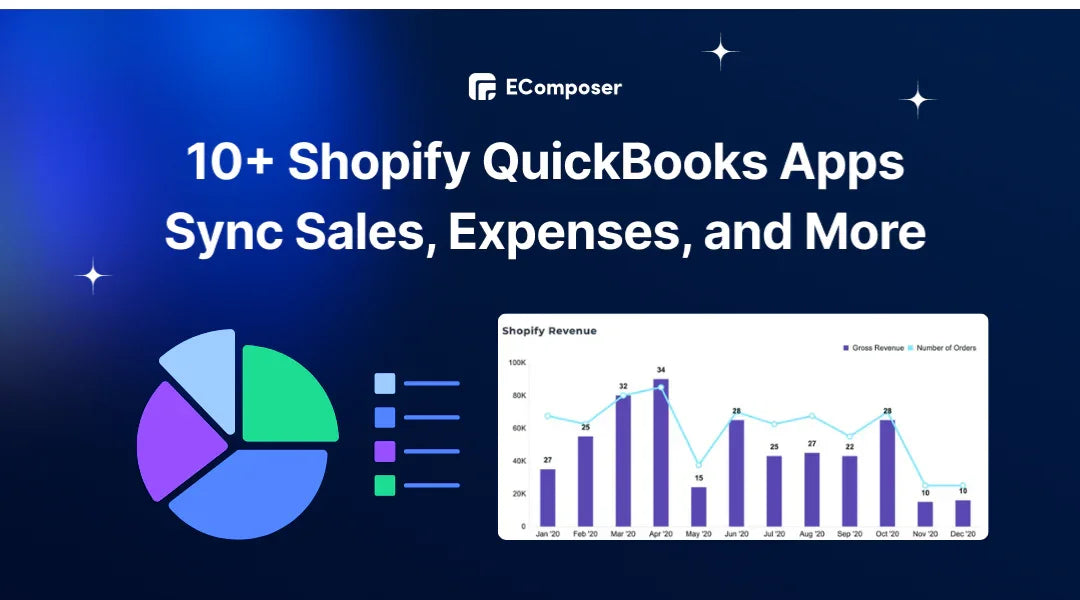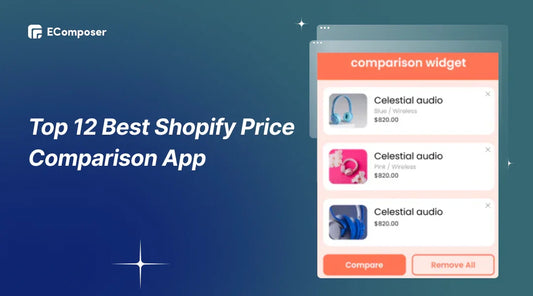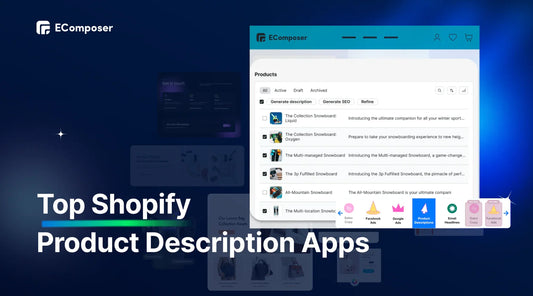10+ Shopify QuickBooks Apps: Sync Sales, Expenses, and More

Table Of Contents
Managing finances and keeping sales records neat is super essential for any online store that wants to do well. If you have a Shopify store, you can use QuickBooks to make all that boring accounting stuff easier. There are lots of apps to help you do this, but we've picked the 10 best ones to save you time and make sure your business runs smoothly. So, let's get to know about the top apps that connect your Shopify store with QuickBooks!
Why Integrate Shopify with QuickBooks?
Shopify and QuickBooks integration is a smart move for store owners who want to make their business lives easier. It has a bunch of benefits that help you manage your money and store better. Here's why you should think about it:
- Automate Accounting Tasks: When you sync your Shopify store with QuickBooks, all your sales info, taxes, and spending get copied over automatically. That means no more typing stuff in by hand, which saves time and stops mistakes.
- Real-Time Financial Insights: You get real-time reports that show how much money is coming in and going out. This keeps you in the loop about your store's financial health without waiting for updates.
- Improve Inventory Management: The integration makes sure your stock levels stay right by updating them every time you make a sale. This helps you avoid selling things you don't have and not having enough of what you do have.
- Tax Compliance and Accuracy: It keeps all your tax info neat from Shopify sales, so when it's time to do taxes, you're all set and don't have to worry about missing anything.
- Save Time and Reduce Errors: With automation, you can spend less time worrying about money stuff and more time making your business grow. It's like having a helper that stops errors from happening.
Related post: The 11 Best Shopify Accounting Apps for Your Store
Quick Comparisons of Top Shopify QuickBooks Apps
|
# |
App Name |
Vendor |
Price |
Free version |
Rating |
Get App! |
|
1 |
QuickBooks Online Global |
Intuit |
Existing customers: Free Essentials: $30/m Plus: $55/m Advanced: $85/m |
4.9/5 of 2,720 votes |
Get app! | |
|
2 |
QuickBooks Online by Webgility |
Webgility |
Basic: $59/m Pro: $119/m Advanced: $179/m |
No |
4.9/5 of 922 votes |
Get app! |
|
3 |
QuickBooks Desktop Sync |
Webgility |
Plus: $139/m Advanced: $249/m Premium: $499/m |
No |
4.9/5 of 363 votes |
Get app! |
|
4 |
A2X Sync for QuickBooks & Xero |
A2X Software Limited |
Mini: $29/m Basic: $45/m Professional: $79/m Advanced: $115/m |
No |
4.9/5 of 308 votes |
Get app! |
|
5 |
QuickBooks/Xero sync ‑ Synder |
CloudBusiness Inc |
Free Medium: $65/m Scale: $115/m Large: $275/m |
Yes |
4.6/5 of 273 votes |
Get app! |
|
6 |
QuickBooks Bridge |
Parex Technologies Pvt Ltd |
Pay As You Go: $0.2/ order Silver: $10/m Gold: $20/m Platinum: $30/m |
No |
4.8/5 of 190 votes |
Get app! |
|
7 |
Xero & QuickBooks Smart Sync |
MicroAngel |
Starter: $9/m Standard: $29/m Pro: $49/m Unlimited: $99/m |
No |
4.9/5 of 75 votes |
Get app! |
|
8 |
Shoplink Sync for QuickBooks |
MKP Software |
Basic: $40/m Pro: $90/m QuickBooks POS: $100/m |
No |
4.9/5 of 35 votes |
Get app! |
|
9 |
QuickBooks Sync by MyWorks |
MyWorks |
Launch: Free Rise: $24/m Grow: $49/m Scale: $89/m |
Yes |
5/5 of 34 votes |
Get app! |
|
10 |
Link My Books for Xero & QBO |
Link My Books |
Starter: $17/m 1K Lite: $35/m 5K Pro: $65/m 10K Pro: $99/m |
No |
5/5 of 29 votes |
Get app! |
Top 10 Most Popular Shopify Quickbooks Apps
1. QuickBooks Online Global

QuickBooks Online Global is the top app retailers should consider in order to keep track of their money. Business owners can manage their money better and have all their financial info in one place without any hassle.
Key Features
- Automated Data Import: The app imports sales data from Shopify to QuickBooks Online automatically to save time and effort.
- Product Sharing: The app allows merchants to share added products from Shopify to QuickBooks Online effortlessly.
- Stock Synchronization: The app updates stock levels between QuickBooks Online (Plus or higher) and Shopify.
- International Integration: The app connects all Shopify storefronts to QuickBooks Online accounting for merchants selling outside the U.S.
- Easy Management: Users can easily manage the connection between Shopify and QuickBooks Online.
Pros & Cons
|
Pros |
Cons |
|
|
Price
- Existing customers: Free (For existing QuickBooks Online users)
- Essentials: $30/m (For new users, QBO Essentials + Connector)
- Plus: $55/m (For new users, QBO Plus + Connector)
- Advanced: $85/m (For new users, QBO Advanced + Connector)
Rating
4.9/5 of 2,720 reviews
2. QuickBooks Online by Webgility

If you are looking for a Shopify Quickbooks app, Webgility QuickBooks Online manages money more easily for businesses. It automates important tasks to help keep your financial stuff in order and spend less time worrying about numbers.
Key Features
- Real-Time Automation: The app downloads and posts orders to QuickBooks in real-time.
- Accurate Reconciliation: Shopify reconciliation matches bank deposits and payouts quickly and accurately.
- Payout Management: The app posts Shopify payouts and order updates to QuickBooks.
- Multichannel Inventory Sync: The app updates product availability with each sale across multiple channels.
- Sales Analytics: Analytics show sales performance and seasonal trends across all channels.
- Broad Integration: Webgility connects Shopify, online marketplaces, and over 50 other business apps to QuickBooks. Pros & Cons
|
Pros |
Cons |
|
|
Price
- Basic: $59/month
- Pro: $119/month
- Advanced: $179/month
Rating
4.9/5 of 922 reviews
3. QuickBooks Desktop Sync

QuickBooks Desktop Sync connects Shopify stores and other business applications to QuickBooks Desktop/Enterprise and manages finances efficiently.
Key Features
- Detailed Syncing: Webgility posts transaction events as individual line items, providing clarity and transparency in financial records.
- Efficient Reconciliation: The app matches bank deposits and payouts quickly and accurately.
- Error Elimination: Accounting automation eliminates errors from manual bookkeeping.
- Multichannel Inventory Management: The app updates all product listings with each sale.
- Automated Tasks: Automation generates purchase orders and shipping labels automatically.
- Comprehensive Data Syncing: Users can effortlessly sync orders, customers, inventory, payouts, and more to QuickBooks Desktop/Enterprise.
Pros & Cons
|
Pros |
Cons |
|
|
Price
- Plus: $139/month
- Advanced: $249/month
- Premium: $499/month
Rating
4.9/5 of 363 reviews
4. A2X Sync for QuickBooks & Xero

A2X automates e-commerce accounting and reconciles Shopify payout data. Financial transactions can be tracked to ensure users stay informed about their business performance.
Key Features
- Accurate Tracking: A2X accurately tracks Shopify payout data in QuickBooks, Xero, Sage, or NetSuite.
- Tax Rule Assignment: Users can avoid overpaying taxes by assigning specific tax rules to every Shopify transaction type.
- COGS Monitoring: A2X helps users stay on top of their cost of goods sold (COGS) by matching it with Shopify sales.
- Professional Access: Users gain access to accounting professionals specializing in Shopify through the A2X Directory.
- Multi-Channel Automation: A2X automates ecommerce accounting across every sales channel, including point-of-sale systems.
- Financial Visibility: The app delivers confidence in financial numbers with automated ecommerce accounting.
Pros & Cons
|
Pros |
Cons |
|
|
Price
- Mini: $29/month
- Basic: $45/month
- Professional: $79/month
- Advanced: $115/month
Rating
4.9/5 of 308 reviews
5. QuickBooks/Xero sync ‑ Synder

Synder automatically syncs financial data to QuickBooks, Xero, or Sage Intacct. Businesses can achieve accurate financial records and effortless reconciliation.
Key Features
- Auto-Sync Functionality: Synder automatically syncs Shopify sales, fees, inventory, taxes, and more to QuickBooks, Xero, or Sage Intacct.
- Flexible Sync Mode: Users can choose to sync daily summarized entries or each individual sale.
- Historical Transaction Import: The app allows users to import years of historical transactions while protecting against complete duplicates.
- Multichannel Support: Synder supports over 25 sales platforms, enabling users to synchronize all sales, fees, inventory, and taxes from various channels into one tool.
- Quick Setup: Users can connect all their sales channels with Synder in under 15 minutes.
- Trusted by Professionals: Many Shopify merchants and accountants trust Synder for its reliability in managing bookkeeping with Xero, Sage Intacct, and QuickBooks.
Pros & Cons
|
Pros |
Cons |
|
|
Price
- Free
- Medium: $65/month
- Scale: $115/month
- Large: $275/month
Rating
4.6/5 of 273 reviews
6. QuickBooks Bridge

QuickBooks Bridge is an automated solution that syncs sales data between Shopify and QuickBooks. If you need individual order details or summarized invoices, this app simplifies e-commerce accounting for Shopify store owners.
Key Features
- Individual Order Sync: Sync detailed individual orders, including customer information, product specifics, and taxes, directly to QuickBooks.
- Summary Invoice Sync: Generate one entry per payout, organizing sales data by payment method for simplified reconciliation.
- Automated Sync Process: Set up automated syncing or choose manual syncing for added control and flexibility.
- Easy Reconciliation: Achieve straightforward and clear reconciliation for daily transactions and payouts from Shopify.
Pros & Cons
|
Pros |
Cons |
|
|
Price
- Pay As You Go: $0.2/ order
- Silver: $10/month
- Gold: $20/month
- Platinum: $30/month
Rating
4.8/5 of 190 reviews
7. Xero & QuickBooks Smart Sync

Shopify store owners can reconcile the process by automating invoice creation and syncing numbers with Xero or QuickBooks. All transactions match bank deposits for precise only in one-click reconciliation.
Key Features
- Automated Invoice Creation: Reconcilely automatically generates invoices for sales, fees, and refunds in real-time.
- Custom Ledger Mapping: Assign custom ledger mappings by product type or country group.
- Real-Time Order Syncing: Orders are synced in real-time to Xero or QuickBooks from multiple gateways and currencies.
- Advanced Tax and Fee Management: The app organizes tax-inclusive or exclusive sales, refunds, gift cards, and fees for a clear view.
- Comprehensive Inventory and Contact Syncing: Reconcilely syncs stock, inventory, and contact details to maintain up-to-date records across platforms.
Pros & Cons
|
Pros |
Cons |
|
|
Price
- Starter: $9/month
- Standard: $29/month
- Pro: $49/month
- Unlimited: $99/month
Rating
4.9/5 of 75 reviews
8. Shoplink Sync for QuickBooks

Shoplink Sync reduces manual entry tasks related to accounting. This Shopify Quickbooks app should be one of the best choices for business owners to try.
Key Features
- Effortless Integration: The app seamlessly connects Shopify to QuickBooks Desktop and POS, automating data flow and reducing manual input.
- Accurate Data Sync: Orders, customer data, inventory, and pricing are synchronized to ensure consistency and accuracy across platforms.
- Swift Setup: With an intuitive interface and straightforward setup, users can connect their stores quickly and start using the app effectively.
- Comprehensive Support: Shoplink provides highly rated customer support for smooth onboarding and troubleshooting assistance.
- Advanced Features and Coming Enhancements: Customizable options cater to advanced needs, with upcoming features like QBD Vendor Bill and PO creation for enhanced functionality.
Pros & Cons
|
Pros |
Cons |
|
|
Price
- Basic: $40/month
- Pro: $90/month
- QuickBooks POS: $100/month
Rating
4.9/5 of 35 reviews
9. QuickBooks Sync by MyWorks

MyWorks Sync is a helpful app for people with Shopify stores who want to make their bookkeeping easier. QuickBooks and Shopify are integrated so that all your money stuff matches up nicely without you having to do it all by hand.
Key Features
- Accurate Data Synchronization: MyWorks ensures up-to-date and precise data syncs between Shopify and QuickBooks, keeping inventory, pricing, customer, and order details aligned.
- Advanced Customization: Users can access advanced features like custom field mapping and transaction fee support to tailor the sync to specific business needs.
- Effortless Management: The sync process is managed directly from Shopify, providing a convenient and user-friendly interface for users.
- Quick Setup and 24/7 Support: MyWorks offers a swift onboarding process and top-rated customer support available at any time to assist with setup and troubleshooting.
Pros & Cons
|
Pros |
Cons |
|
|
Price
- Rise: $24/month
- Grow: $49/month
- Scale: $89/month
Launch: Free
Rating
5/5 of 34 reviews
10. Link My Books for Xero & QBO

Link My Books for Xero & QBO connects makes sure all your sales and costs are in one place, so you don't have to worry about mixing bookkeeping things up. Plus, it makes it really easy to check that everything matches up between your store and your accounting software.
Key Features
- Fast Bank Reconciliation: Link My Books makes reconciling sales to bank deposits nearly instantaneous.
- Wide Payment Gateway Support: The app supports Shopify Payments, PayPal, Klarna, and various other gateways.
- Multiple Store Connections: Users can connect multiple Shopify stores to a single Link My Books account, syncing directly with Xero or QuickBooks.
- Accurate Tax Management: Link My Books automatically applies the correct tax rates based on each transaction’s jurisdiction.
- Efficient Summary Invoices: With each payout, the app creates a clean summary entry that matches deposits exactly.
Pros & Cons
|
Pros |
Cons |
|
|
Price
- Starter: $17/month
- 1K Lite: $35/month
- 5K Pro: $65/month
- 10K Pro: $99/month
Rating
5/5 of 29 reviews
How to Choose the Right Shopify QuickBooks App?
1. Evaluate Key Features
The core parts of each app will help you pick the best one for your Shopify store. These parts are important for making your business run smoothly. They include:
- Automatic order syncing: This means your orders are updated quickly and easily without you having to do extra work.
- Real-time inventory management: You can see how much stock you have at all times, so you don't oversell products.
- Tax and shipping handling: The app takes care of these for you, so you don't have to worry about them.
- Multi-channel support: If you sell on different platforms, the app will manage your sales from all of them.
Related post: 16 Best Accounting Software For Shopify
2. Establish a Budget
Setting a budget is key to finding a cost-effective QuickBooks integration that meets your needs. Subscription plans can range widely, from basic integrations to premium services with more features, and monthly fees may vary between $10 and $100 or more, depending on the functionality. Beyond the monthly cost, some apps have hidden fees, such as extra charges for high transaction volumes or additional support, so you should consider the pricing structure to avoid unexpected costs.
3. Read Reviews and Ratings:
Reading reviews from other people who use Shopify can help you a lot when you're looking at apps. These reviews have stars that tell you if the app is good or not. If an app has 4 stars or more, that's a great sign that it's a reliable one. But don't just stop at the good stuff! You should also check out the negative reviews. That way, you can learn about any problems people might have had and how well the app helped them out.
FAQs
What payment apps work with QuickBooks?
- QuickBooks Payments: It works well with both the computer (desktop) and internet (online) versions of QuickBooks. You can take money from people using credit cards, debit cards, or even their bank accounts (ACH). Deposits usually occur within 1 to 2 business days to improve cash flow.
- PayPal: This is a trendy way to handle payments online. You can take payments using credit cards, debit cards, or even let people pay using their PayPal wallet. When you use PayPal with QuickBooks, it makes sure all your transactions are kept neat in your accounting stuff.
- Stripe: Stripe enables you to accept payments from debit cards to credit, in addition to digital wallets such as Apple Pay. When you use it with QuickBooks, all your transactions are recorded correctly, making it easier to keep track of your finances.
- Square: Square has a little gadget (mobile card reader) for taking card payments in person, and it also does digital payments. When you sync it with QuickBooks, it helps you keep your sales info, stock levels, and customer details all in one place.
Related post: 10 Best Payment Methods for your Shopify stores
Does Shopify POS work with QuickBooks desktop?
Shopify POS can connect with QuickBooks Desktop, even though Intuit stopped supporting QuickBooks Desktop POS. If you use QuickBooks Desktop, you can still link your Shopify POS. When moving from QuickBooks POS to Shopify POS, you can transfer stuff like customer details, vendor info, and what you sell.
Related post: 4 Best Shopify POS Integrations
How can you import products from QuickBooks to Shopify?
To import products from QuickBooks to Shopify, follow these steps:
- Install the QuickBooks App: Go to the Shopify App Store and search for the QuickBooks app. Install it in your Shopify store by clicking on the "Add app" button.
- Connect Your Accounts: After installation, open the QuickBooks app and follow the guidance to connect your QuickBooks account. You also need to access your QuickBooks account and provide the required permissions for the integration.
- Choose Products to Import: Once connected, navigate to the import section of the app. Here, you can select specific product categories or choose to import all products from QuickBooks.
- Map Product Fields: Ensure that the product fields from QuickBooks (like name, price, description, and inventory levels) are correctly mapped to the corresponding fields in Shopify. This step is crucial for maintaining accurate product information.
- Initiate the Import: Click the import button to start transferring your products from QuickBooks to Shopify. The app will process the data and import it into your Shopify store.
- Set Up Ongoing Synchronization: If the app supports ongoing synchronization, set this up to automatically update product information in Shopify whenever changes are made in QuickBooks.
Conclusion
Integrating Shopify with QuickBooks helps you manage what you sell and keep track of your money easily. To maximize your store’s potential further, Ecomposer—a fast page builder to make your store look attractive for more customers to buy your stuff. Just get Shopify free trial and give Ecomposer a go to build a store that's both beautiful and smart.























0 comments